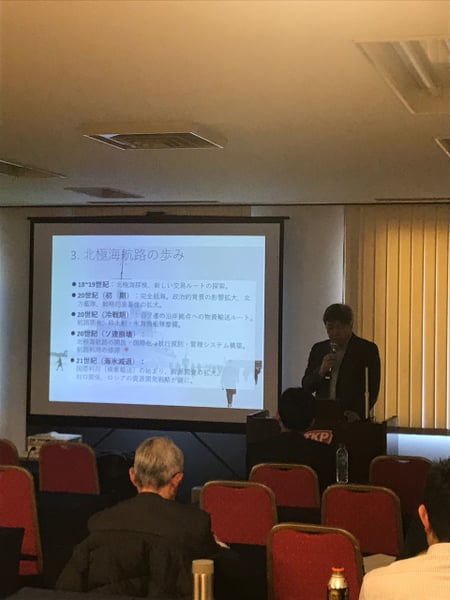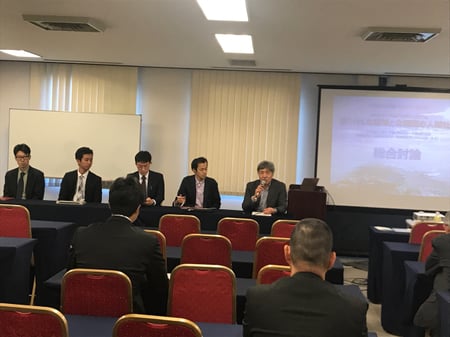In order to face and respond to the global warming and related change in the Arctic, action should be taken not only by way of natural science, engineering science, and social science individually, but also by integrating approach. On the basis of this, the symposium had been carried out by researchers from two research fields as natural/engineering science (Theme-1; working on “Predictability study on weather and sea-ice forecasts linked with user engagement”) and social science (Theme-7 working on “People and Community in the Arctic: Possibility of Sustainable Development”) from the ArCS Project together.
In the Theme-1 project, researchers boarded R/V Mirai on her first-ever voyage to thin-ice covered Arctic Ocean in early winter. This voyage was supported by satellite monitoring of sea ice, ice prediction model, and unitized vessel navigation service system, which were all developed by Theme-1 members. And through her voyage, atmospheric phenomena, wave, icing of ship body were observed by the Theme-1 members. Dr. Inoue (the principle investigator of the research group) and Mr. Fushimi (Tokyo Univ.) summarized the observation voyage of R/V Mirai and research activities on board. Through the voyage, she entered into the water area of early stage of sea ice formation and edge of ice-covered area many times and investigated the satellite sea ice monitoring and ice forecast model.
The Theme-7 project is consisted of three thematic researches as the Arctic economic development, interaction between humans and the environment, and research on discussions at international organizations. Dr. Goto (Hokkaido Univ.) summarized the research activities and research events that were carried out to co-work with people in the Arctic regions. In Sakha Republic, 500 years of history on interaction between human and permafrost was investigated. In Greenland, through the co-working process of researchers and local people on interaction between ice-ocean environment and human activity, multi-disciplinary knowledge is about to be developed. And in Alaska (U.S.A.), compatibility of scientific research on fishery control and indigenous traditional knowledge was demonstrated. Prof. Otsuka (Hokkaido Univ.) introduced current status of maritime activity of the Northern Sea Route and perspective of it in the future.
Following above, Dr. Sueyoshi (National Institute of Polar Research) summarized how the ArCS project has been confronted with implementing research outcomes and scientific knowledges to stakeholders and society related. Mr. Fujikawa (Sasakawa Piece Foundation, Ocean Policy Research Institute) introduced their achievement in developing international cooperation on Arctic issues, and current collaboration with Iceland. And in the end of the symposium, theme on interdisciplinary research collaboration between natural and social scientist was discussed by all participants.
Natsuhiko Otsuka (Hokkaido University, A member of Theme 7)






